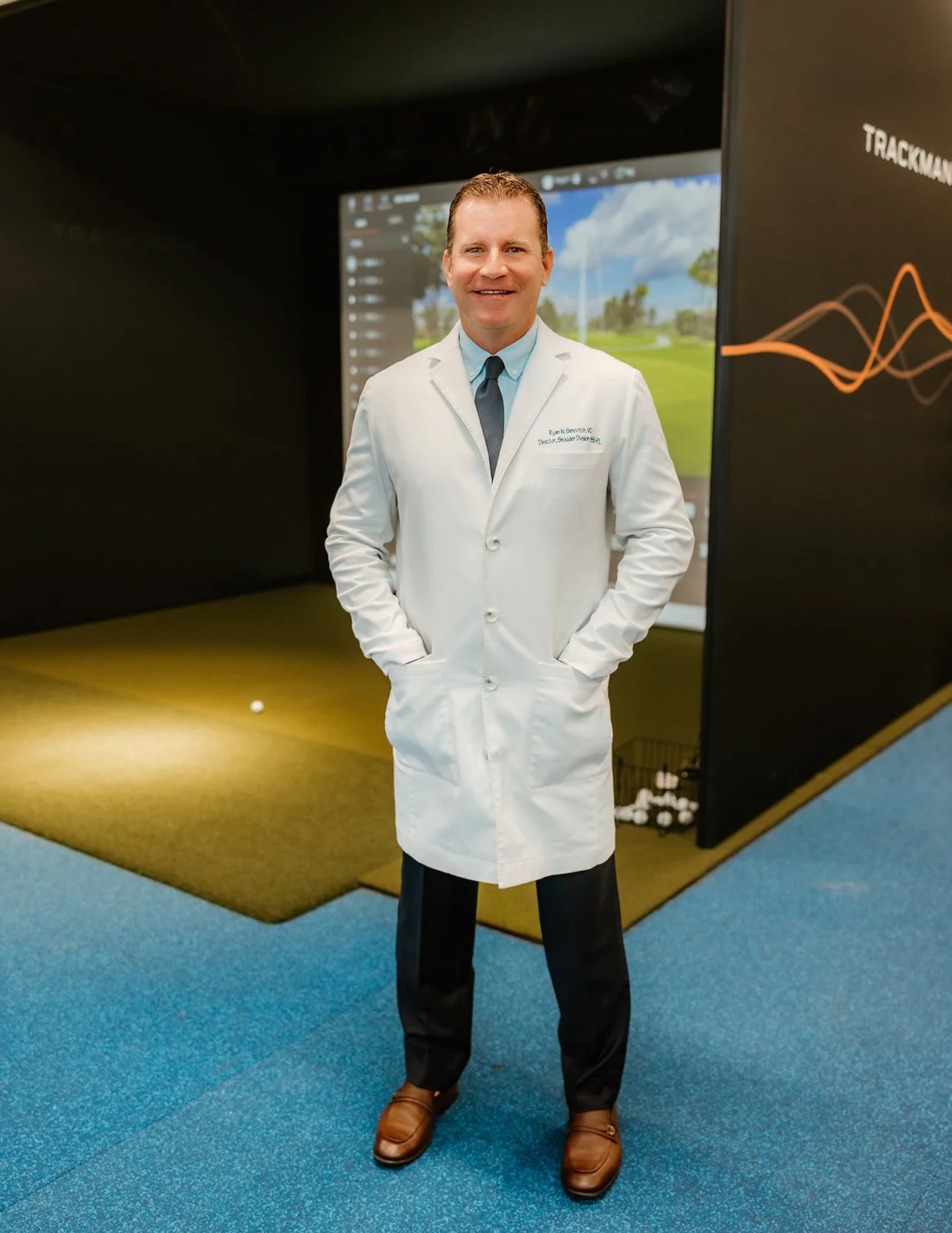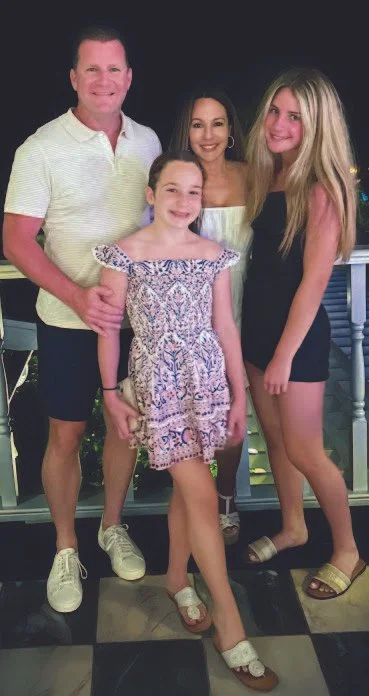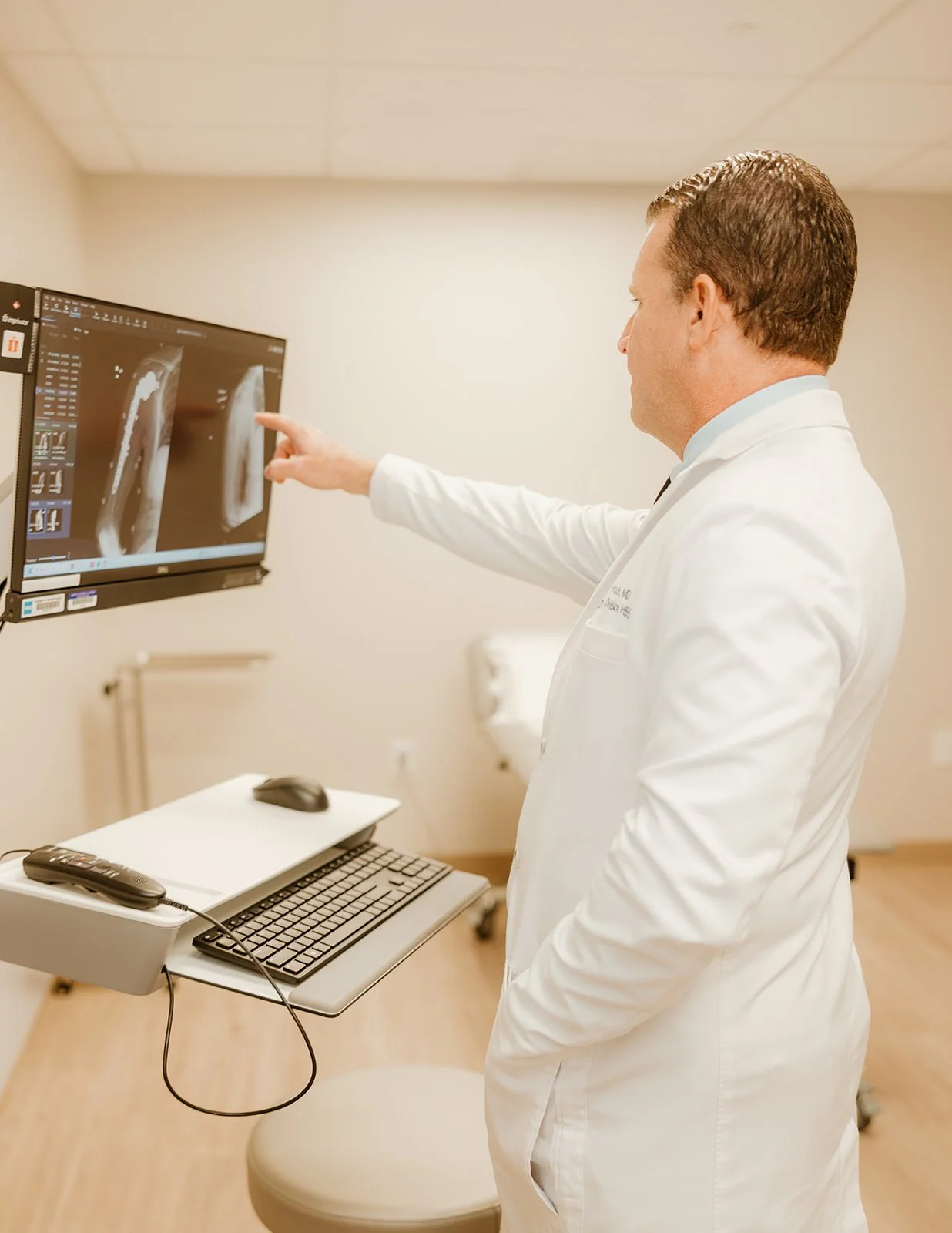Dr. Ryan Simovitch, Hospital for Special Surgery: Bring World-Class Orthopedic Care to Jupiter
Written by: John Pacenti
For Dr. Ryan Simovitch, medicine runs in the family.
His father, Harvey, was a pediatrician in Miami for 49 years, practicing into his 80s. Simovitch’s sister followed in their father’s footsteps, also becoming a pediatrician.
Dr. Ryan Simovitch at HSS Florida's West Palm Beach office, in front of their high-tech golf simulator, which is used to see how patients are rehabbing through therapy and how it is impacting their golfing.
Photo by Elizabeth Palace
“I grew up in a family of doctors,” said Simovitch, the director of the shoulder division at HSS Florida. “I think from a young age, it was instilled in me that medicine is a noble profession, a career in which you can truly make a difference in people’s lives.”
Simovitch found his calling in orthopedic surgery, fueled by his interest in the mechanics of movement and the ability to get people back to what they need and love to do after an injury. He has devoted his highly specialized sports medicine practice to treatments and surgery for shoulder injuries, such as rotator cuff repair, shoulder replacement surgery, and revision surgery when a second replacement is needed.
The surgeon sat down with The Influencer Jupiter to talk about the services at HSS Florida, and its expansion into Jupiter, where a new facility is set to open in the coming months.
Hospital for Special Surgery (HSS), earned its reputation for cutting-edge orthopedic care in New York City. In recent years, it has expanded into Palm Beach County, with a state-of-the-art location in West Palm Beach and an additional office in Wellington.
The Jupiter location represents more than just a new medical space—it's a strategic extension of HSS's mission. The facility will be near Jupiter Medical Center.
“There's a large concentration of patients in that area who could benefit from our services,” Simovitch said from HSS’s expansive complex in West Palm Beach. “And I don't think it's just specific to Jupiter. It's a good launching point, so that we could also serve patients farther north into Martin and Indian River Counties. We have a fair number of patients who come down to West Palm from those areas now, and we want to make access easier for them.” Jupiter is also home for Simovitch, his wife, Shana, and their two children.
Dr. Simovitch with his family: Wife Shana, and daughters Tori (left) and Sloane. Of living in Jupiter, he says, 'It's just an easy place to live, easy place to commute, good people, and a great place to raise a family.' Photo courtesy Dr. Simovitch
“We like the water, we like boating, and we like to visit the beach. So Jupiter is kind of an obvious choice,” Simovitch said. “It's just an easy place to live, easy place to commute, full of good people, and a great place to raise a family.” His wife, who is a former CPA and who worked as a private wealth manager, spends her free time building and selling single-family homes. “She’s building one in Jupiter right now,” Simovitch said.
HSS, founded in 1863, has been ranked No. 1 for orthopedics for a record-breaking 16 consecutive years by U.S. News and World Report. Simovitch said the hospital is results-driven and every decision revolves around quality.
"We're very purposeful," he added. "HSS has always been very quality and outcome-driven, which is reflected in its reputation. Our mission is to provide evidence-based, compassionate and respectful care to all of our patients."
HSS keeps track of the number of patients who have been told elsewhere they require surgery and come in for a second opinion.
“About 53% of the time, we disagree with a patient’s outside opinion and tell them surgery is not their best or only course of action,” he said. “Conservative treatments, such as physical therapy, cortisone shots and biologics, such as platelet-rich plasma, may be options for many patients before choosing surgery." Simovitch said 60% of his surgeries are minimally invasive arthroscopic.
Photo by Elizabeth Palace
The common belief that “all surgeons want to cut” does not apply at HSS. Simovitch says when it comes to potential joint replacement, patients know when it's time.
“There are very few reasons why an operation for that should be done unless a patient feels like they've gotten to the point where they can no longer live with the problem and nothing else has worked, right?” he said.
Simovitch gravitated towards sports medicine after his mentor at Duke University 25 years ago involved him in the care of the vaunted Men’s Blue Devil basketball team. This mentor specialized in shoulders and Simovitch found it to be a fascinating and intricate joint.
“I joke with my patients that knees are simple and only move one way but shoulders are very complicated,” he said.
Simovitch has another Jupiter connection: he is the physician who cares for the St. Louis Cardinals in Jupiter, where the team has its training and rehab facility and its Single-A minor league team.
The orthopedic surgeon is also involved in HSS research. In West Palm Beach, the office has a high-tech golf simulator combined with motion analysis software.
“We started a study using the simulator where we look at outcomes in golfers who have a hip, knee or shoulder replacement to relieve severe arthritis. Both before and after surgery, we track their golf swing mechanics and output each step of the way using sophisticated software and analysis,” Simovitch said.
There is a sizable number of patients who decide to have joint replacement whose goal – besides eliminating pain – is to get back on the golf or tennis courts or to the outdoor activity they love.
Golfers are just one area of research that HSS is involved in locally. Another sophisticated study is looking at using adipose tissue – body fat – and injecting it in aching joints for potential pain relief.
And then there is A.I. – Simovitch is excited about progress in machine learning, as orthopedic surgeons try to determine which patients are best suited for surgery, and who will most likely have a successful recovery.
“We are getting closer to being able to predict patient outcomes at two and five years after surgery before we even make an incision,” he said. “The goal is to help us identify factors that could be modified before a patient has surgery to improve outcomes."



